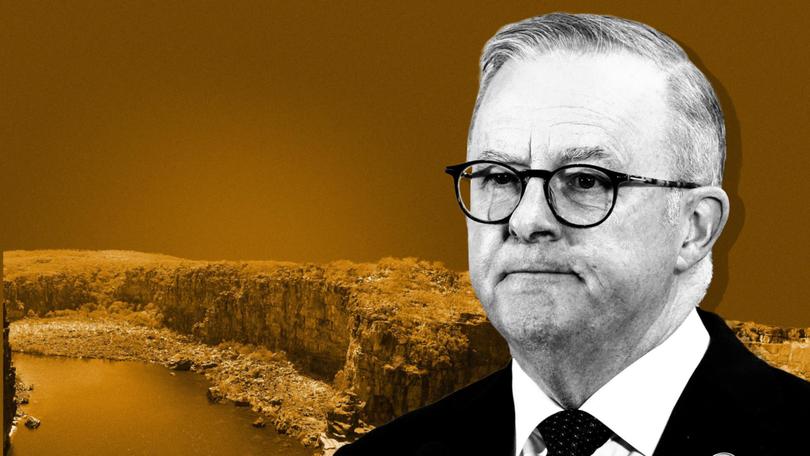Opposition says lives at risk if new wave of boat arrivals hits Australia’s treacherous north-west coast
As the Opposition warns of a new wave of boat arrivals testing our borders, locals said it was a miracle anyone survived the treacherous conditions on Australia’s far north-west coast.

It’s a wild and treacherous country along Australia’s far north-west coast, not somewhere you’d want to be blindly stumbling for a few days in the hope of being rescued by a passerby.
Crocodile-infested, isolated and deadly dry in parts, the lonely Kimberley coast has drawn at least three boatloads of asylum seekers and the nation’s attention since November last year.
Most of the latest group to arrive wandered into Mungalalu Truscott Airbase on Friday afternoon, a group of 15 men who were reportedly Chinese nationals. The final member of their party was found on a road near the airbase on Sunday morning by West Australian Police, who said he was in “relatively good condition”.
Sign up to The Nightly's newsletters.
Get the first look at the digital newspaper, curated daily stories and breaking headlines delivered to your inbox.
By continuing you agree to our Terms and Privacy Policy.By Monday, the men were understood to have joined the other recent arrivals, 39 men who landed in February and 12 who also turned up at Truscott in November, at Australia’s offshore processing facility on Nauru.
While Prime Minister Anthony Albanese insisted there had been no change to our border protection policy since 2013 and that no unauthorised arrivals would be able to stay in Australia, local authorities and the Federal Opposition said the Government was failing to keep the area safe.
Shadow home affairs minister James Paterson said the spate of arrivals, and the fact this latest group were the first Chinese asylum seekers for more than 10 years, was alarming and showed that people smugglers in south-east Asia have opened a “new migration pathway” into Australia.
Warning that the Government’s “loss of control” on the borders was inciting the new wave of arrivals, he said conditions were mirroring those that sparked the inception of the secretive Operation Sovereign Borders in 2013.
Mr Paterson said the abolition of temporary protection visas last year had “sent the wrong message to people smugglers” and that it “has regrettably encouraged people to get on boats again”.
“The reason why that’s such a problem is we know that last time that cost at least 1200 lives at sea,” he said.
“We don’t want to see that happen again.”
Mr Paterson called for more border control resources, including drones. He also repeated claims, disputed by the Government, that budget cuts had led to aerial surveillance being reduced by 20 per cent and maritime patrols by 12 per cent.
Wyndham East Kimberley shire president David Menzel said a stronger military presence was needed to patrol the area, adding the people smugglers were clearly well-informed about where they were dropping the new arrivals.
“I’ll give these people credit for their navigation skills because they are spot-on and seem to manage to drop these people off right near some settlements every time,” he said.
“It’s concerning that we’re not getting the level of resources we need here.
“There seems to be a disconnect between what the Government is saying and what the Opposition is saying about the level of resources, and I’ve just got no idea who’s telling the more accurate story.
“But there’s no doubt that we’ve had three boats in the last five months, so the important thing is there’s a message that’s not getting out to the people who are buying these boat rides. The messaging into south-east Asia needs to be lifted to make sure these people know they’re not going to stay here.”
While the boat arrivals have generated headlines, it was unlikely that the Coalition’s efforts to make illegal immigration a key issue at the next election would be successful, according to veteran pollster Kos Samaras.
“I can’t see it scratching the sides given the cost-of-living crisis that most Australians are grappling with,” said Mr Samaras, director of RedBridge Group.
“The next election will be defined around the economy, how it’s been managed by the Government, how bad the situation has become for a lot of households as they’ve dug deeper into their savings to get through the mortgage stress and mental stress situation out there.
“And we know that people under the age of 45 have a very different view about boat people in general.”
However, the conservative-aligned Institute of Public Affairs warned Australians were extremely concerned about immigration and that the issue of boat arrivals was conflated for many with population growth.
Recent IPA polling found that 60 per cent of Australians wanted to pause migration, said the outfit’s deputy executive director Daniel Wild.
“People are not just saying we want it to be reduced or we want to cut, they’re actually saying we want to press pause on the whole program, “ he told The Nightly.
“It’s not just a conservative issue, it’s across politics. Whether you’re a Labor voter, a Coalition voter, One Nation, whatever it might be, there is a pretty broad base of concerns about the sustainability of the migration program and what it’s actually doing to people’s lives.”

There was a risk that the febrile political debate on illegal immigration would lend to the perception that Australia’s border policy had softened and thereby further encourage people smugglers, said Jake Davies, who is completing his PhD on immigration politics at the University of Sydney.
“If you talk down Australia’s border security policies, there is a saying that ‘loose lips bring ships’,” he said.
“It will potentially incentivise the people smugglers to send people to Australia because they’ll read the headlines and see that supposedly Australia’s become a soft touch. So it’s actually potentially quite dangerous politics.”
For veteran WA pilot Steve Irvine, who spent 40 years flying above the Kimberley coast before retiring, the most surprising thing about the recent spate of arrivals is that outsiders would be able to survive the conditions.
“There are thousands of miles of coastline where people can be dropped off,” said Mr Irvine, the owner of Shoal Air in Kununurra.
“And if they get dropped off in the wrong part of that coastline, they are doomed. If they’re not found they will perish, and who knows, there may be some out there who have died.
“But I guess if the smugglers want to get repeat business, they’ve actually got to land people near some form of population or habitation. But there aren’t that many of those and they seem to know what they are doing because they keep dropping them somewhere they will be found.
“It’s not somewhere you want to be wandering around. People die out there from dehydration and other dangers very quickly.”

